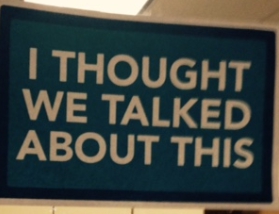Developing Loyality Requires a Culture Built on Feedback
March 25, 2015
DEFINING A CORPORATE CULTURE
March 27, 2015LEADERSHIP & VALUES
The successful manager in today’s climate needs a number of tools in order to stay a key player in the traditional organization, as well as be a leader in the new environment and culture of the companies that survive in our future fast-paced working world. There is a great deal of risk in creating a new style and culture of American business. Though many attitudinal changes are taking place every day, the reality is that American managers got their positions the old-fashioned way, by winning in the old culture. They must continue to look, act and survive in that culture while intuitively believing in a different one, allowing their own organization to experience possibly a different culture than the rest of the company. They need to deliver the results of the old culture while embracing a longer term vision and attitude than many of their peers. This whole process requires a sense of purpose and a belief that there is a better way.
In one of my previous posts I mentioned that one of the two major reasons for the rapid change in the business environment is the baby boom and its effects on all aspects of society. I have a general belief that buried in this front edge of the baby boom is a group of managers that was permanently influenced by the ’60s experience. These people are just hitting their 60s, and taking their place in the senior executive ranks of many businesses. They have quietly been working their way up the corporate ladder, investing in their families and their careers, and are now going to be placed into key decision areas at a critical time in American business history. These same people were in universities and colleges when major American institutions were not accepted as truthful and changes were demanded. They questioned the values of the leaders and without any vested ownership, forced change in the system.
Today these people do have a vested ownership in a system, but are being confronted with the prospect of needing to change — the very thing they demanded in their youth. The very definition of the values they hold dear will be questioned. The spirit of the ’70s and early ’80s is deep and I project that it will play a role in the coming years. The desires to change, to work toward a greater good, and to be more involved in important decisions, along with a greater commitment to the human spirit, will pay a critical role in America’s ability to manage its way back to economic power.
Thoughts on Values
These essays contain many references to values, and their role. Most employee problems are related to a difference in values. In the business environment your values are reflected in three distinct kinds of decisions: How you spend money, how you use your time, and how you treat other people:
How You Spend Money
Each manager has some power over spending money, whether personally or by their people. No matter how many times I have discussed spending money, the conversations are the same. How do you relate to the cheapest price? What do the words “best value” mean? What is the role of loyalty and quality service? What are the factors that allow you to trust someone? If you share similar views on these topics there is a strong chance you will spend money the same.
The problem with spending money is the fact that most major corporations need to struggle to increase profit margins in very competitive environments. This leads to very short term decisions in order to “make the numbers.” This truly puts the long-term/short-term goals and decisions at very intense points, when the result of the discussion is the awarding of contracts or choice of a producer.
How You Spend Your Time
Use of time seems to be most tied to people’s personality styles. Each manager spends a majority of their personal time either at work or thinking about work. This equation is somewhat based upon the amount of commitment one has to the company’s plans and strategies, the fear one has about the security of their job, or the ultimate work load that a manager must get accomplished. The problem of judging people’s use of time is you can never know whether someone is just spending time or is being productive. In many ways, quality time is related to clear priorities and the level of focus that an individual is able to maintain. As the old story says, when alligators are biting at your heels, it is difficult to remember that the reason you were in the swamp was to drain it — even if you have gotten rid of some of the alligators and only new ones are left. The reality is that each manager is judged by their boss as to whether or not they are efficiently using their time; at the same time, each middle manager is judging their subordinates’ use of this time. In the end, judgment is related to the level of a shared focus and picture of what success looks like between each manager, the subordinates, and the boss.
How You Treat People
The most telling value, as well as the area of management relationships with the most potential difficulty, is the perception of how you treat co-workers. People feel strongly about the treatment of other human beings. In many ways, the degree of a person’s self-centeredness becomes obvious when it comes to how they relate to others. Self-centered people will always start with a “me first” attitude. The simple signals of letting someone else speak without interruption, and making sure everybody gets a chance to participate seem basic, but in stressful and aggressive environments they are the true test of an individual’s values in this area.
As I mention in other posts, everything you really needed to be successful you learned by the time you left kindergarten. And though many times the class bully got his way, we all know that in the end the class bullies failed. People got faster or bigger or more likely smarter, and at the right time the bullies got “had.” Even in the most aggressive environments, people who treat others in a respectful manner are given extra support when they are in trouble. People who become the organizational bullies always get helped “out” whenever they run into trouble. The payoff for treating people fairly is when you are in trouble other people will try to help you. If you are a bully, don’t mess up or you’re dead.Always ask, am I leaving this person a way out with dignity? If the answer is yes, other people will notice, and trust and respect will grow. If the answer is no, watch out.





